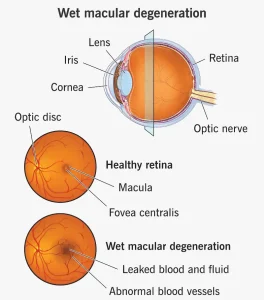Overview
Wet macular degeneration, also known as neovascular age-related macular degeneration (AMD), is a chronic eye condition that affects the macula, the central part of the retina responsible for sharp, detailed vision. It occurs when abnormal blood vessels grow under the retina and leak fluid or blood, leading to rapid damage to central vision.
Although less common than dry macular degeneration, the wet form is more severe and can cause sudden vision loss if not treated promptly. Early diagnosis and ongoing treatment are essential to preserve vision.
Symptoms
Symptoms of wet macular degeneration often develop quickly and may include:
-
Sudden or rapid loss of central vision
-
Blurred or distorted vision, where straight lines appear wavy
-
Dark or empty areas in the center of vision
-
Difficulty reading, driving, or recognizing faces
-
Changes in color perception
-
Reduced contrast sensitivity
Peripheral vision usually remains unaffected, but central vision loss can significantly impact daily activities.
Causes
Wet macular degeneration develops when abnormal blood vessels form beneath the retina and macula. These vessels are fragile and prone to leaking fluid or blood, which damages retinal cells.
Contributing factors include:
-
Progression from dry macular degeneration
-
Abnormal growth of blood vessels driven by vascular endothelial growth factor (VEGF)
-
Age-related changes in the retina
-
Reduced oxygen supply to retinal tissues
The exact trigger for abnormal vessel growth is not always known.
Risk Factors
Several factors increase the risk of developing wet macular degeneration:
-
Age over 50 years
-
History of dry macular degeneration
-
Smoking
-
Family history of macular degeneration
-
Cardiovascular disease or high blood pressure
-
Obesity
-
Prolonged exposure to ultraviolet light
Complications
Wet macular degeneration can lead to serious vision-related complications if untreated:
-
Permanent central vision loss
-
Severe visual distortion affecting daily tasks
-
Loss of independence due to visual impairment
-
Increased risk of depression or anxiety
-
Reduced quality of life
Prompt treatment can slow disease progression and help preserve remaining vision.
Prevention
While wet macular degeneration cannot always be prevented, certain measures may reduce risk or support eye health:
-
Regular comprehensive eye examinations, especially for older adults
-
Quitting smoking and avoiding tobacco exposure
-
Managing blood pressure, cholesterol, and cardiovascular health
-
Eating a balanced diet rich in leafy greens, fruits, and omega-3 fatty acids
-
Wearing sunglasses to protect eyes from ultraviolet light
-
Monitoring vision changes at home and seeking immediate care for sudden visual symptoms
Early detection and treatment with anti-VEGF injections or other therapies can significantly slow vision loss and improve long-term outcomes.
Advertisement

